Commentary on 1 Chronicles 12:5
Verse Text: "Ezer, the chief, was over the sons of Manasseh, and they were valiant men, who were very mighty men of valor." (1 Chronicles 12:5)
Introduction
The narrative in 1 Chronicles 12:5 highlights key figures among the warriors who rallied to David during his ascent to kingship. This verse forms part of a larger context, where the Chronicler recounts the support David received from various tribes of Israel, illustrating the breadth of his appeal and the loyalty he inspired.
Contextual Background
The Book of Chronicles serves as a historical account with a particular emphasis on the Davidic monarchy and the temple worship in Jerusalem. The Chronicler aimed to provide hope and encouragement to a post-exilic audience, underscoring the importance of rightful leadership and faithfulness to God.
Significance of Ezer and the Sons of Manasseh
1. Ezer's Leadership:
Ezer, whose name means "help," epitomizes the divine providence in Israel's history. The name may signify that God is the ultimate help for His people, aligning with the role of leaders as instruments of God’s support.
2. The Sons of Manasseh:
The sons of Manasseh represented one of the oldest tribes in Israel, known for their strength and valor. Their alliance with David indicates a pivotal moment where tribal loyalties shifted from Saul’s house to David, marking a critical transitional phase in Israel’s monarchy.
Attributes of the Warriors
The Chronicler emphasizes the attributes of the warriors, describing them as "valiant" and "mighty men of valor." These descriptors have profound implications:
- Valiance: Represents courage and boldness in the face of impending conflicts, a necessary trait for those who support a new kingdom.
- Might: Indicates not only physical strength but also moral fortitude, a characteristic desired in leaders and followers alike.
Theological Reflections
This passage serves as a reminder of God’s faithfulness in raising up leaders and warriors in times of transition. The bravery of the sons of Manasseh can be seen as mirroring God’s own courage and might as He leads His people through tumultuous times.
Exegetical Insights
Matthew Henry's Commentary:
Matthew Henry emphasizes the divine origin of Ezer's and the warriors’ strength, noting that their abilities and valor were a direct result of God's empowering presence among them. Their unifying cause under David illustrates the importance of shared vision in leadership.
Albert Barnes' Notes:
Albert Barnes elaborates on the significance of their allegiance to David. He remarks on the transition from Saul's reign to David's and how the tribes that supported David were instruments of a divine plan for Israel's restoration and unity.
Adam Clarke's Commentary:
Adam Clarke provides insight into the military prowess attributed to these brave men. He discusses the historical context of the tribes' warfare experiences and their preparedness to engage in battle, highlighting how God prepared them for this crucial moment in Israel’s history.
Applications for Today
This verse speaks profoundly to contemporary audiences, particularly pastors and leaders:
- Faithful Leadership: Leaders are called to inspire loyalty and commitment among their followers, mirroring David's ability to attract diverse groups for a common purpose.
- Divine Strength: Emphasizing that true strength comes from God's empowerment, leaders should seek divine assistance in their endeavors.
- Community Support: The warriors of Manasseh highlight the importance of community and solidarity in pursuing God’s plans. In a fractured society, unity is paramount.
Conclusion
1 Chronicles 12:5 serves as a vital reminder of the strength found in divine assistance and communal loyalty. In the context of ancient Israel's transition to a united monarchy under David, it encapsulates themes of leadership, courage, and the faithful response of God's people. As modern readers reflect on this passage, they are called to consider their role within the broader narrative of God's kingdom and the importance of standing alongside divinely appointed leaders for the work of the Church today.


